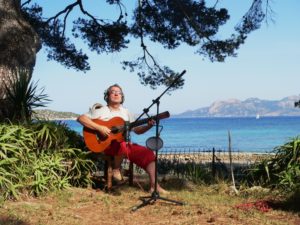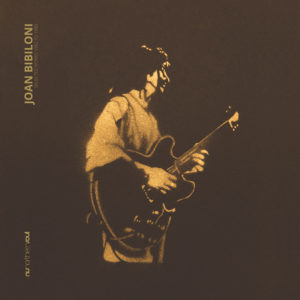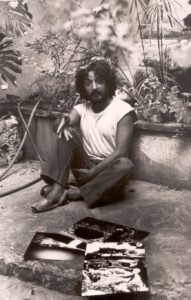Joan Bibiloni’s Selected Works released by Ibiza’s NuNorthernSoul label15th August 2020

On 28 August, Ibiza record label NuNorthernSoul will release Selected Works 1982 to 1989 by Mallorca’s Joan Bibiloni.
David Holzer recently had the pleasure of speaking with Phat Phil Cooper, the man behind NuNorthernSoul and a few days later at the great record store Xocolat in Palma de Mallorca, Joan Bibiloni himself about how Selected Works came to be.
Originally from Wales in the UK, Phat Phil Cooper has been a DJ, record shop owner, broadcaster, music consultant and label runner.
He started coming to Ibiza back in 1990, first DJ’d at Amnesia in 1996, was a resident DJ at the Cream superclub from 1996 to 98 and DJ’d for Ministry of Sound in 1999. He’s also played at the legendary Café Del Mar. Nowadays, he DJ’s at Pike’s and Hostal La Torre in Ibiza.
Along the way, Phil has worked with people like Grace Jones and DJ Harvey and presided over prestigious Boiler Room sessions. ‘Quite high end stuff,’ he says before adding, ‘I think I’m just someone who knows the way certain dancefloors work.’
If Covid-19 hadn’t come along, Phil would have been DJing at festivals all over the world this year, including Gilles Peterson’s We Out Here festival in the UK, G! Festival in the Faroe Islands and others in Detroit and Chicago.
Birth of NuNorthernSoul
The idea for NuNorthernSoul started when Phil was DJing for Cream and travelling around the world.
‘I lived in a big house with two other music-loving friends,’ Phil told me. ‘On the odd Sunday I had off, the rules of the house were that the first person up and awake would make the coffee and put on an album. Then we’d cook and play music all day. It became a social thing and friends would drop in. A very shrewd friend of mine opened a bar with a DJ booth and told us he wanted to bring the concept into the bar. We then spent all Sunday there playing Balearic inspired music.’
A veteran of the Northern Soul scene used to come to sessions in the bar and loved the crowd and the vibe. ‘This reminds me of the old Northern Soul days,’ he told Phil. ‘It’s almost new Northern Soul.’
Phil loved the name. It stuck and he’s been running the label for the past 10 years. ‘We’re a label for music with soul,’ he says.
Finding Joan Bibiloni’s music
Phil first heard Joan’s music on an excellent 2014 compilation put together by Dutch specialist label Music From Memory, the vinyl-only LP El Sur, which the label described as highlighting Joan’s ‘unique ambient fusion and sundrenched Mediterranean beach boogie’.
‘I was just blown away,’ Phil said. ‘Joan’s music is timeless. I’m privileged to soundtrack sunsets, one of the greatest natural wonders we have and Joan’s music fits that because of where he grew up in and still lives. I started digging around online and found out that Joan was still alive and well in Mallorca. I was looking for a project to do for Record Store Day and to cut through the chaff I needed something really impressive. Joan and his music were perfect.’
Phil contacted Joan who invited him to go through his catalogue and pick the tracks he wanted. Joan sent Phil original files from different albums that were then mastered to sound great on vinyl.

Selected Works includes tracks from Joan’s first solo album Joana Lluna in 1982 up to 1989 album Born, both released on his own Blau label. It also covers his excellent 1988 album For A Future Smile.
Presentation is important to Phil who pays extra-close attention to sleeve notes and artwork. To give a sense of where Joan is coming from, respected music journalist Marc Rowlands interviewed him for the Selected Work sleeve notes, a cover was designed, and the five track EP was ready to launch for Record Store Day in April.
Sadly, the event was cancelled but Selected Works will be released to coincide with the three-day Record Store events happening at the end of August.
‘I’m looking forward to seeing how Joan’s music does,’ Phil said, ‘and maybe coming up with a second release next year. I’m trying to get to Mallorca and meet with Joan. As well as putting out more of his older stuff, I’d love to see if he’s got original master tapes or can get hold of them. It would be great to see whether some of the contemporary producers I work with would be up for reinterpreting some of his older stuff, almost remixing it. Some of the amazing tracks he’s done are quite short. When I do sunsets I usually play 10-minute versions.’
Talking music – eventually – with Joan Bibiloni
I’ve interviewed a fair number of musicians. I can’t imagine any of them starting a conversation with a long, funny and oddly significant anecdote about saving the life of a drowning female rat so it could live to eat their tomatoes for another day.
Joan Bibiloni told me he was born on the Spanish equivalent of April Fool’s Day, 28th December, el Diá de los Santos Inocentes (the Day of the Holy Innocents) and there’s something both tricksterish and seemingly guileless about him. But he’s no fool.
He’s also a funny, energetic guy and not at all the kind of mellow, wafty, hippy character you’d imagine making ‘Balearic’ music.
Joan was born in Manacor, a town on the eastern side of Mallorca, in 1952. In the early 60s, like teenagers all over the world, he fell in love with The Beatles, Stones and all the rest.
This was the time of Franco but, thanks to tourism, there was a little more freedom in Mallorca. Teenagers like Joan had the chance to see The Kinks at the Bullring in Palma, The Animals on the Paseo Maritimo and Hendrix at Sergeant Pepper’s in Terreno, Palma.
At the same time, as Joan told Marc Rowlands, he ‘picked up on Jimmy Smith, Kenny Burrell, Brian Auger, and Julie Driscoll, Wes Montgomery and Sabicas, who was a very good flamenco guitar player in the time just before Paco de Lucia. There was also a lot of Mallorcan or Balearic music, which had influences like flamenco and Arabian music. Many of the island’s inhabitants are of Arabic descent, they were here even before the Catalans came in the 12th century. Many of the working songs sung by people on the island still have melodies and sounds which come from Arabic music, it is clearly not European.’
Joan started his first band with a couple of other guys in 1964. When I first interviewed him by email back in 2015, he told me their microphone was ‘a piece of wood attached to an amp by the string used to bind sobrassada, the bright orange Mallorcan sausage.’
From 1966, when he released his first single, Joan’s life was music. He formed prog-rock band Zebra in his twenties. With Pepe Milan, formerly of Euterpe, he became blues-folk duo Milan & Bibiloni.

Joan first met musicians from Deià, the remarkable cutural enclave on Mallorca’s northwest coast at the legendary Guitar Centre in Palma, which existed from the 1960s to the 80s. Everyone played there.
In 1975 or ‘76, Joan began playing guitar for Tony Anderson, brother of Jon Anderson, singer in British prog heavyweights Yes. Tony had briefly fronted Los Bravos, a partly Mallorcan band who scored a US number 4 hit with Black is Black in 1966.
In 1975, Joan moved to Llucalcari, just up the coast from Deià and Mallorca’s smallest village. It was then that he became part of the Deià music scene.
When I first interviewed him, he said of those Deià Daze, ‘I was emotionally configured by the area. And it was fun. Everything had some kind of comic approach. We couldn’t stop laughing. I remember Kevin cooking the best fish curry I ever had in my life. My time in Llucalcari also taught me to cook, converse and appreciate nature.’
Joan played with Daevid Allen on Now Is The Happiest Time Of Your Life, Daevid’s second solo album as well as Gilli Smythe’s Mother. He also produced the Kevin Ayers LP Deia…Vu in 1980.
My introduction to Joan came through his great friend Tomás Graves, son of Robert. Tomás and Joan have known each other since the mid-70s and Tomás describes him as a ‘very good musician, very funny. I get along with him very well.’
I met Joan for the first time at Xocolat record store a couple of weeks ago. Pointing to an album nearby, he said ‘This is on my Blau label. I started the company. Xocolat is my house.’
After we’d spoken for some time about everything but Joan’s music – his English has an endearing occasional London twang to it – I finally switched on my recorder. I asked Joan how he feels when people like Phil discover his music. Did it surprise him?
‘It doesn’t surprise me but it makes me feel good. The Dutch compilation put me in a space that I was maybe not in before. Now I’m glad there are a bunch of people who feel good about it because I’m quite critical with my work,’ he said, ‘but I’ve never been interested in saying how good or bad I am. The maximum I can say to you is “I’ve done that, listen to it”. My work keeps me going.’
Would Joan say he makes ‘Balearic’ music. He replied, ‘When you give a name to something, it’s just like having a bee’ and then made a buzzing sound. ‘You know what I mean?’
I didn’t quite but I assumed he meant it was irrelevant. He did. ‘After all these years, I might say my music has been influenced by my surroundings. Mallorca has a certain light, a certain space, a certain smile, certain people – no regrets – a certain something that it maybe helps to put a name to but even then, to me it’s not important.’
This matter of fact approach to his music is one of the most endearing things about Joan. Explaining how he got into jazz, he said simply ‘When I was playing rock and the clubs closed, the only places that were still open were the jazz clubs. I could keep going without being a dropout and I met the best jazz players on the island.’
It’s a question of knowledge but also to put your tummy on top of the table and relax. To be laidback. Joan Bibiloni
When I asked Joan how he felt about playing with Daevid Allen and Kevin Ayers, he shrugged and said ‘At this time I was very well trained. I had no problems to play with them. Even my head was well-trained. I’d say I gave them vocation, sympathy, technique and musicality.’
He shrugged again, ‘and, who knows, maybe even a few funky moments.’
‘I followed my nose,’ he said. ‘Although I’m influenced by a lot of people, I’m self-taught and very permissive with myself. I love me. I mean, I don’t say when I look at myself in the mirror “Oh, I’m a great man.”. I just say, “Keep on doing what you’re doing”.
Today, keeping on doing what he’s doing means following his other loves alongside music and production. Apart from tending his garden and making Mallorcan food, Joan races and breeds trotting horses that rejoice in names like Janis Joplin.
I only found this out from Tomás Graves later. That afternoon in Xocolat, I switched off my recorder and Joan gleefully told me a couple of hilarious, unpublishable stories about Daevid Allen.
Joan Bibiloni’s Selected Works 1982-1989 is available here only on vinyl. It comes with hand stenciled artwork by Chris Maude, and extensive sleeve notes from Marc Rowlands. The release also contains a poster of the sleeve artwork. Apart from the splendid music, it’s a lovely thing and well worth having.
Listen to a lovely recent poolside session at Pikes Hotel by Phat Phil Cooper.
 Written by David Holzer, a Mallorca based author, journalist and blogger.
Written by David Holzer, a Mallorca based author, journalist and blogger.







